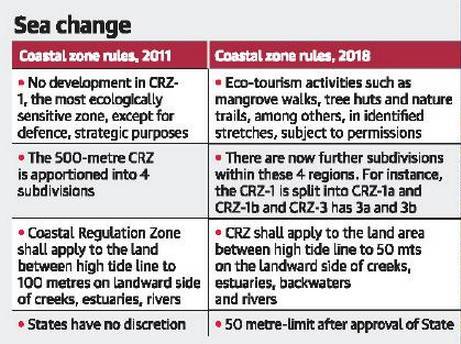Relevance: Prelims/Mains: G.S paper II: Polity: Governance
Context:
- The illegal apartment complexes in Maradu, Kerala were razed by controlled implosion, marking the completion of the demolition drive of the waterfront high rises.
• The razing of the four luxury apartments was ordered by the SC in May 2019, for breaching CRZ norms. The court had called the illegal constructions a colossal loss to the environment.
Provisions Under CRZ Norms, 2018:
- In India, the CRZ Rules govern human and industrial activity close to the coastline, in order to protect the fragile ecosystems near the sea. Under these rules, the regulation zone has been defined as the area up to 500 meters from the high-tide line.
• These norms restrict certain kinds of activities like large constructions, setting up of new industries, storage or disposal of hazardous material, mining, reclamation and bunding within a certain distance from
the coastline.
• The restrictions depend on criteria such as the population of the area, the ecological sensitivity, the distance from the shore and whether the area had been designated as a natural park or wildlife zone.
• The 2018 Rules have a no-development zone of 20 meter for all islands close to the mainland coast and for all backwater islands in the mainland.
• For the CRZ-III (Rural) areas, two separate categories have been stipulated. In the densely populated rural areas (CRZ-IIIA) with a population density of 2,161 per sq. km as per the 2011 Census, the no-development zone is 50 m from the high-tide level. CRZ-IIIB category (rural areas with population density below 2,161 per sq km) areas continue to have a no-development zone extending up to 200 m from the high-tide line.
• While the CRZ Rules are made by the Union Environment Ministry, implementation is to be ensured by state governments through their Coastal Zone Management Authorities.
Criticism of CRZ Norms:
- The CRZ rules dilutes the letter and spirit of enforcing an Integrated coastal zone management plan to safeguard the coast and interest of fishing communities.
• The environmentalists had alleged that the notification will open up fragile intertidal areas to real estate agents.
• Other experts say that the rules have been framed with the intent to favour large-scale industry at the cost of fishing communities.
• Under the rules, big hotels, restaurants, houses, coastal highways and small and large port facilities can now be built closer to the shoreline. Increased coastal tourism translates into further destruction of lagoons, marshland and other coastal ecosystems and their services.
• The consideration of frequent weather-related coastal vulnerabilities has been omitted in the CRZ norms, 2018. As has moved the concept of vulnerability and the hazard line from being at the heart of the regulatory mechanism to an optional appendage in the law.
For more such notes, Articles, News & Views Join our Telegram Channel.
Click the link below to see the details about the UPSC –Civils courses offered by Triumph IAS. https://triumphias.com/pages-all-courses.php


